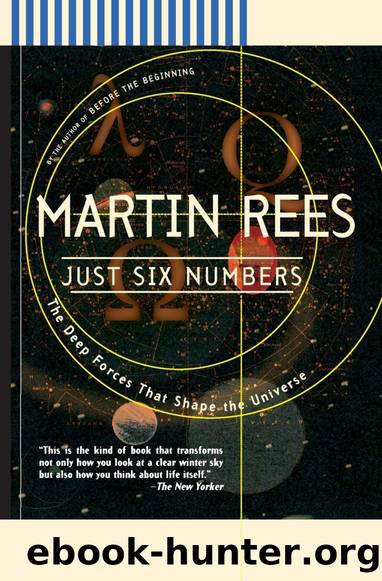Just Six Numbers: The Deep Forces That Shape the Universe by Martin Rees

Author:Martin Rees [Rees, Martin]
Language: eng
Format: epub
ISBN: 9780786723584
Google: uyLLBQAAQBAJ
Amazon: 0786723580
Goodreads: 34474426
Publisher: Basic Books
Published: 2022-12-23T06:00:00+00:00
THE TUNING OF THE INITIAL EXPANSION
Ω may not be exactly one, but it is now at least 0.3. At first sight, this may not seem to indicate fine tuning. However, it implies that Ω was very close indeed to unity in early eras. This is because, unless expansion energy and gravitational energy are in exact balance (in which case Ω is, and remains, exactly equal to unity), the gap between those two energies widens: if Ω were to start off slightly less than unity in the early universe, eventually the kinetic energy would completely dominate (so that Ω becomes very small indeed); on the other hand, if Ω were substantially more than unity, then gravity would soon get the upper hand and bring the expansion to a halt.
The range of âtrajectoriesâ for our actual universe, consistent with what the dark-matter evidence tells us about the present value of Ω, is shown in Figure 6.1. The figure also depicts some universes in which life as we know it couldnât have emerged. It highlights a basic mystery: Why is our universe still, after ten billion years, expanding with a value of Ω not too different from unity?
There are, as weâve seen in the last chapter, good grounds for extrapolating back to when the universe was one second old and at a temperature of ten billion degrees. Suppose that you were âsetting upâ a universe then. The trajectory it would follow would depend on the impetus it was given. If it were started too fast, then the expansion energy would, early on, have become so dominant (in other words, Ω would have become so small) that galaxies and stars would never have been able to pull themselves together via gravity and condense out; the universe would expand for ever, but there would be no chance of life. On the other hand, the expansion must not have been too slow: otherwise the universe would have recollapsed too quickly to a Big Crunch.
Download
This site does not store any files on its server. We only index and link to content provided by other sites. Please contact the content providers to delete copyright contents if any and email us, we'll remove relevant links or contents immediately.
| Aeronautics & Astronautics | Astronomy |
| Astrophysics & Space Science | Comets, Meteors & Asteroids |
| Cosmology | Mars |
| Solar System | Star-Gazing |
| Telescopes | UFOs |
Tools of Titans by Timothy Ferriss(8360)
Turbulence by E. J. Noyes(8037)
Secrets of Antigravity Propulsion: Tesla, UFOs, and Classified Aerospace Technology by Ph.D. Paul A. Laviolette(5364)
Astrophysics for People in a Hurry by Neil DeGrasse Tyson(5172)
Room 212 by Kate Stewart(5102)
Design of Trajectory Optimization Approach for Space Maneuver Vehicle Skip Entry Problems by Runqi Chai & Al Savvaris & Antonios Tsourdos & Senchun Chai(5062)
Pale Blue Dot by Carl Sagan(4993)
The David Icke Guide to the Global Conspiracy (and how to end it) by David Icke(4696)
A Journey Through Divination and Astronomy by Publishing Pottermore(4376)
Goodbye Paradise(3795)
Apollo 8 by Jeffrey Kluger(3701)
COSMOS by Carl Sagan(3617)
The Five People You Meet in Heaven by Mitch Albom(3549)
Losing the Nobel Prize by Brian Keating(3531)
How to Read Water: Clues and Patterns from Puddles to the Sea (Natural Navigation) by Tristan Gooley(3456)
Brief Answers to the Big Questions by Stephen Hawking(3420)
How to Read Nature by Tristan Gooley(3326)
The Order of Time by Carlo Rovelli(3182)
A Brief History of Time by Stephen Hawking(3017)
